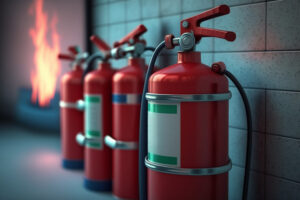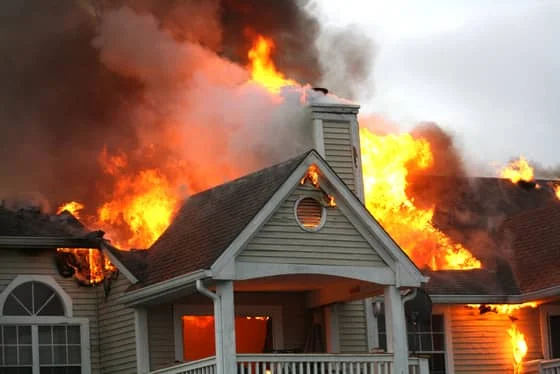Homeowners often overlook certain risks, even though home safety remains an essential concern for all. Many people frequently neglect the refrigerator fire hazard, despite its capability to inflict significant harm and peril. This post intends to draw attention to this matter and provide crucial information regarding prevention strategies and safety practices that can help safeguard your household and family.
Identifying Potential Risks
Refrigerators, similar to all other electronic devices, may present fire hazards if not maintained or supervised correctly. Defective wiring and elevated heat levels are common contributors to refrigerator fires. When homeowners disregard or fail to care for older appliances, they may transform them into significant dangers in the kitchen.
Faulty Wiring: Over time, damaged or corroded wires can lead to electrical sparks or short circuits. Indicators such as worn-out wiring or repeated circuit breaker trips might suggest problems with your refrigerator.
Overheating: Refrigerators require proper ventilation to disperse heat produced by their cooling mechanisms. Inadequate air circulation can result in overheating, potentially leading to a fire.
Signs of Potential Hazard: Be vigilant for unusual smells, such as burning plastic or rubber, and odd noises like buzzing or clicking. These can indicate internal components are failing and might pose a risk.
Preventive Maintenance Tips
Regular upkeep is key to lowering the chances of a refrigerator fire hazard. Consider the following practical advice to keep your appliance functioning safely.
Consistent Upkeep: Dust and debris may build up near coils and vents, restricting airflow. Regularly clean these areas to guarantee efficient and safe operation of your refrigerator.
Check and Replace Components: Periodically inspect cables and components for signs of wear. Replace any that appear damaged to prevent electrical faults.
Proper Placement: Make sure there is sufficient space around your fridge for proper airflow. Do not position it near walls or sources of heat.
Inspect Door Seals: Ensure the door seals are intact and functioning to prevent leaks that can overwork the refrigerator and cause temperature rises. Clean the seals with warm, soapy water and check for cracks or damage.
Monitor Temperature Settings: Keep your refrigerator set to the manufacturer’s recommended temperature to avoid a refrigerator fire hazard and prevent disastrous situations that could lead to selling a fire-damaged house. Setting it too low can cause the appliance to run excessively, leading to potential overheating issues.
Avoid Overloading: Ensure that your refrigerator and freezer are not overloaded with items, as overcrowding can block airflow and force the compressor to work harder than necessary. Keep the shelves organized to promote proper circulation.
Professional Servicing: Regular appointments with a certified appliance technician are recommended, especially for older refrigerators or those displaying wear and tear. A professional can evaluate and troubleshoot parts that may not be apparent or accessible during routine maintenance.
Safety Equipment Recommendations

Smoke Detectors: To enhance safety measures, it is essential to position smoke detectors near the kitchen, allowing for early warnings of any smoke or fire incidents. Additionally, routine testing should be performed to guarantee their operational efficiency.
Fire Extinguishers: Maintain easy access to a fire extinguisher in the kitchen. Acquaint yourself with its functionality to ensure a swift reaction should a fire arise.
Smart Home Devices: It is advisable to implement smart home technologies that can assess the performance of your appliances and provide alerts regarding any potential concerns before they intensify.
Emergency Response Strategies
Despite the implementation of preventive measures, emergencies may still arise. Having the knowledge to respond effectively can significantly impact the outcome.
Immediate Actions: In case of a refrigerator fire, safely unplug the appliance if possible. Use a fire extinguisher for small fires, but do not engage with larger fires on your own.
Safe Evacuation: All family members should be well-informed about safe evacuation procedures in case a fire breaks out. Identify a specific outdoor meeting area and promptly contact emergency services for assistance.
Practice Fire Drills: Periodically run fire drills with your household. A good understanding of evacuation routes and procedures can be instrumental in optimizing response time during genuine emergencies.
Conclusion
Although refrigerator fire threats are a genuine threat, the risk can be considerably decreased with preventative measures. Committing to regular maintenance and furnishing your house with necessary safety equipment, such as fire extinguishers and smoke detectors, creates a safer atmosphere. Prevention is largely dependent on being aware of possible problems like bad wiring or overheating.
Ultimately, having a solid preparedness plan is your most effective strategy against unexpected emergencies. Consistently conducting fire drills ensures that your family is familiar with the necessary procedures during a crisis, which can be crucial for saving lives. By placing importance on preventive measures, you not only secure your property but also achieve a sense of calm, allowing you to appreciate your home without fear.

